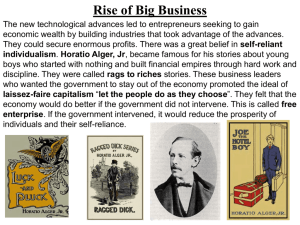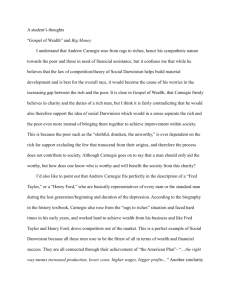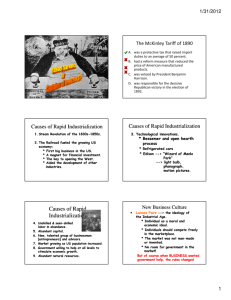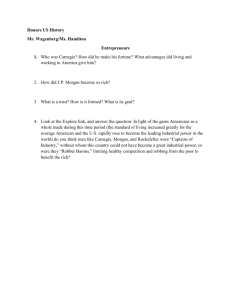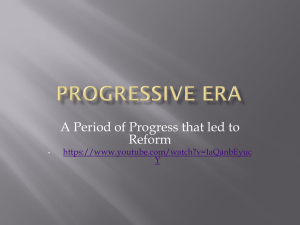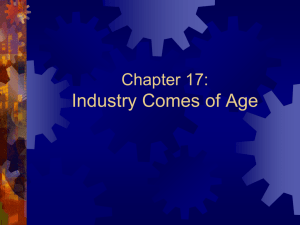"ROBBER BARONS" OR "CAPTAINS OF INDUSTRY"?
advertisement
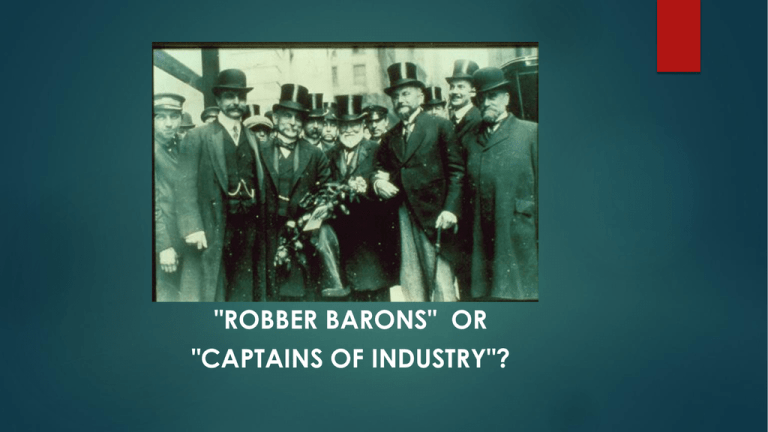
"ROBBER BARONS" OR "CAPTAINS OF INDUSTRY"? Bellwork terms to define: Robber Baron: an American capitalist who got rich at the expense of others, exploited natural resources, or had unfair government influence. Captains of Industry: business leaders who built a personal fortune and contributed positively to the country through jobs and philanthropy (charity) Trust: a monopoly, where a single company or group owns nearly all of the market for a product/service READING: The Gilded Age Vocab Terms: Trustbuster: a person or agency employed to enforce antitrust laws Disparity: a great difference Equitably: fair and impartial Assimilate: take in and fully understand (information, ideas, or culture) Who are these "Titans of Industry" https://www.youtube.com/watch?v=b0bieBdh19k Essential Questions: How do these industrialists HELP America and how do they also perhaps HURT America? How do the lives of the business owners and the workers compare/contrast? Cornelius Vanderbilt http://www.history.com/topics/john-d-rockefeller/videos/the-men-who-builtamerica-the-rise-of-corneliusvanderbilt?m=528e394da93ae&s=undefined&f=1&free=false Notes to take on the Tycoons/Business Owners: "Commodore" Cornelius Vanderbilt Made his name in the shipping industry Began ferrying people across NY Harbor Got a contract from the U.S. government during the War of 1812 Provided transportation to California for prospectors during the Gold Rush Moved into railroads just before the Civil War Acquired the NY Central Railroad in 1869 Built the Grand Central Depot in NY City Shrewd businessman known for cutthroat business tactics John D. Rockefeller & Standard Oil http://www.history.com/topics/john-d-rockefeller/videos/the-men-who-builtamerica-monopoly ROCKEFELLER: America's first billionaire Sold produce and candy as a young man to help make money for the family Got into the oil refining industry in 1863 Saw a profit in the "waste by-products" of crude oil He cut deals with the railroads and ran other companies out of business Founded Standard Oil (controlled 90% of America's refineries) Donated $500 million Andrew Carnegie & U.S. Steel http://www.history.com/topics/john-d-rockefeller/videos/andrewcarnegie?m=528e394da93ae&s=undefined&f=1&free=false CARNEGIE: Scottish born "Rags-to-Riches" story Started work as a "bobbin boy" in a cotton factory for $1.20 a week, then as a telegraph operator for the superintendent of the Pennsylvania Railroad Invested in telegraph, iron, and oil companies before creating Carnegie Steel Amassed wealth through vertical monopoly strategies His reputation was hurt by the violence of the Homestead Strike Sold Carnegie Steel to Morgan for $480 million Devoted the rest of his life to philanthropy through his "Gospel of Wealth" "The man who dies thus rich dies disgraced." He gave away up to $350 million to build libraries, organs for churches, and Carnegie Hall J.P. Morgan http://www.history.com/topics/john-d-rockefeller/videos/the-rise-of-j-pmorgan?m=528e394da93ae&s=undefined&f=1&free=false MORGAN: Born into a wealthy New England family Followed his father into banking Used his wealth to consolidate and reorganize financially troubled railroads, gaining controlling stock in 1/6 of America's rail lines In America's financial crisis of 1895, he loaned the federal government $60 million Bought Carnegie Steel and then created U.S. Steel Corporation So how and why did a select few get so prosperous? SOCIAL DARWINISM: Social Darwinism was the application of Charles Darwin`s scientific theories of evolution and natural selection to contemporary social development. In nature, only the fittest survived—so too in the marketplace. This form of justification was enthusiastically adopted by many American businessmen as scientific proof of their superiority. GOSPEL OF WEALTH: The Gospel of Wealth, or sometimes the Gospel of Success, was the term for a notion promoted by many successful businessmen that their massive wealth was a social benefit for all. The Gospel of Wealth was a softer version of Social Darwinism. The advocates linked wealth with responsibility, arguing that those with great material possessions had equally great obligations to society
